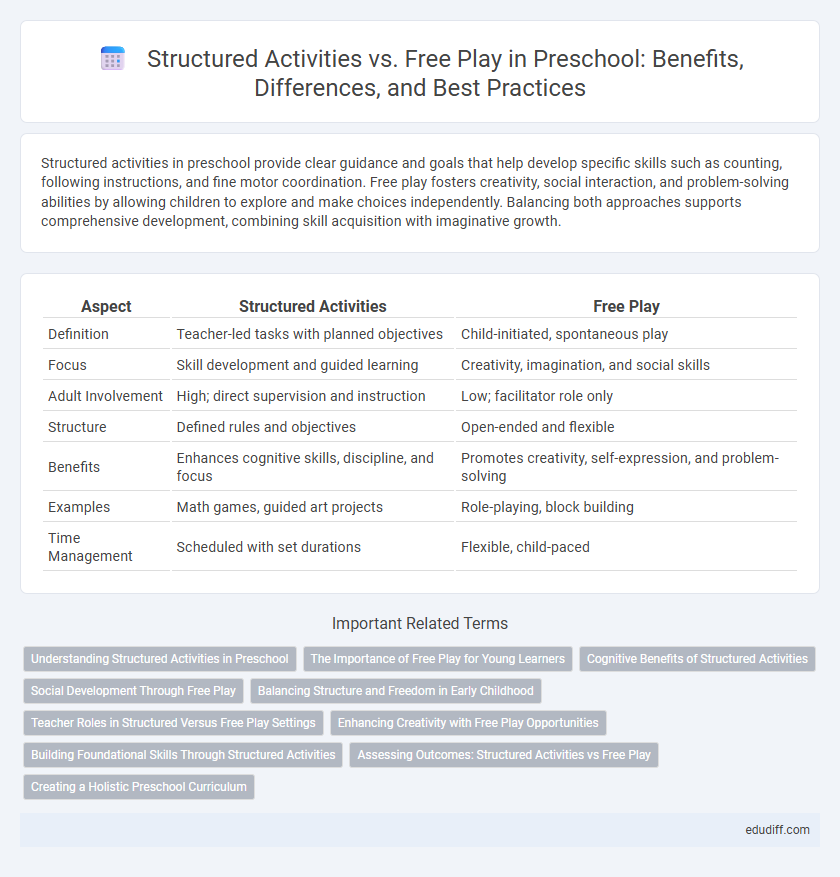Structured activities in preschool provide clear guidance and goals that help develop specific skills such as counting, following instructions, and fine motor coordination. Free play fosters creativity, social interaction, and problem-solving abilities by allowing children to explore and make choices independently. Balancing both approaches supports comprehensive development, combining skill acquisition with imaginative growth.
Table of Comparison
| Aspect | Structured Activities | Free Play |
|---|---|---|
| Definition | Teacher-led tasks with planned objectives | Child-initiated, spontaneous play |
| Focus | Skill development and guided learning | Creativity, imagination, and social skills |
| Adult Involvement | High; direct supervision and instruction | Low; facilitator role only |
| Structure | Defined rules and objectives | Open-ended and flexible |
| Benefits | Enhances cognitive skills, discipline, and focus | Promotes creativity, self-expression, and problem-solving |
| Examples | Math games, guided art projects | Role-playing, block building |
| Time Management | Scheduled with set durations | Flexible, child-paced |
Understanding Structured Activities in Preschool
Structured activities in preschool provide a planned, teacher-led framework designed to develop specific skills such as literacy, numeracy, and social interaction. These activities create consistent routines that foster cognitive development and classroom discipline while promoting targeted learning outcomes. Emphasizing goal-oriented tasks, structured play complements free play by introducing intentional skill-building opportunities within the early childhood education environment.
The Importance of Free Play for Young Learners
Free play fosters creativity, problem-solving skills, and social development in young learners by allowing them to explore and make choices independently within a safe environment. Unlike structured activities, free play nurtures intrinsic motivation and supports emotional regulation crucial for early childhood growth. Research highlights that balanced inclusion of free play enhances cognitive flexibility and resilience in preschool-aged children.
Cognitive Benefits of Structured Activities
Structured activities in preschool significantly enhance cognitive development by promoting problem-solving skills, attention control, and memory retention through guided tasks. These activities provide a deliberate framework that supports executive functions, enabling children to develop reasoning, planning, and spatial awareness. Research indicates that consistent participation in structured play correlates with improved language acquisition and early math skills, advantages critical for academic success.
Social Development Through Free Play
Free play in preschool settings significantly enhances social development by encouraging children to negotiate, share, and collaborate naturally without adult-imposed rules. This unstructured environment fosters creativity and emotional intelligence as children explore social roles and problem-solving independently. Research shows that free play promotes essential skills such as communication, empathy, and conflict resolution, which structured activities may not fully cultivate.
Balancing Structure and Freedom in Early Childhood
Balancing structured activities and free play in preschool supports cognitive, social, and emotional development by providing children with both guided learning experiences and opportunities for creativity. Structured activities promote skill acquisition and focus, while free play encourages imagination, problem-solving, and independence. Optimal early childhood education integrates a flexible schedule that adapts to individual needs, fostering holistic growth through both deliberate instruction and spontaneous exploration.
Teacher Roles in Structured Versus Free Play Settings
Teachers in structured preschool activities guide learning objectives through planned tasks that promote cognitive, social, and motor development, ensuring targeted skill acquisition. In free play settings, educators adopt an observational and facilitative role, creating a safe environment while encouraging creativity, decision-making, and social interaction. Balancing these roles allows teachers to support holistic development by combining intentional instruction with child-led exploration.
Enhancing Creativity with Free Play Opportunities
Free play in preschool environments significantly enhances creativity by allowing children to explore materials and ideas without rigid guidelines, fostering imaginative thinking and problem-solving skills. Structured activities often provide essential skill-building but may limit spontaneous expression and innovation. Offering ample free play opportunities stimulates cognitive development and encourages children to experiment, collaborate, and invent in an open-ended context.
Building Foundational Skills Through Structured Activities
Structured activities in preschool settings are essential for developing foundational skills such as fine motor abilities, early literacy, and numeracy through targeted exercises and guided interaction. These activities promote cognitive development by providing clear objectives and consistent routines that enhance children's attention spans and problem-solving capabilities. While free play fosters creativity and social skills, structured activities ensure systematic skill acquisition critical for academic readiness.
Assessing Outcomes: Structured Activities vs Free Play
Assessing outcomes in preschool reveals that structured activities enhance cognitive skills and goal-directed behaviors, while free play fosters creativity, social interaction, and emotional regulation. Research indicates that a balanced integration of both approaches supports comprehensive development, promoting academic readiness alongside critical social and emotional competencies. Observational assessments and developmental checklists effectively measure progress across cognitive, social, and emotional domains in both structured and unstructured settings.
Creating a Holistic Preschool Curriculum
Structured activities in preschool promote development of specific skills like literacy and numeracy through guided lessons and targeted exercises. Free play enhances creativity, social interaction, and problem-solving by allowing children to explore interests independently in an unstructured environment. A holistic preschool curriculum balances structured activities and free play to support cognitive, emotional, and physical growth comprehensively.
Structured activities vs Free play Infographic

 edudiff.com
edudiff.com